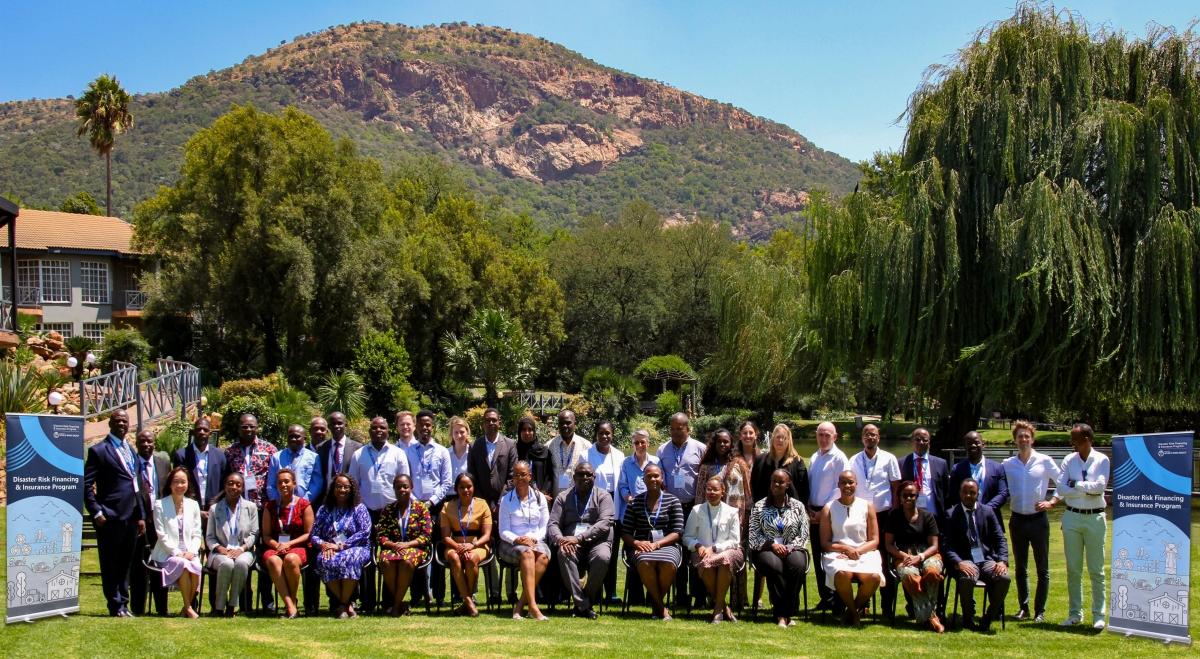Actionable Knowledge for More Resilient Agricultural Livelihoods in Sub-Saharan Africa

Africa is one of the most susceptible regions to the impacts of climate change, and the costs of climate change can be significant. Sub-Saharan Africa is already experiencing erratic weather patterns and is projected to face more extreme climate events. The agricultural sector, which contributed 17 percent to GDP in 2022, and employs more than 50 percent of sub-Saharan Africa's workforce is particularly vulnerable. In turn, the sector affects economic growth. The impact of a drought on medium-term growth in the region is about eight times as high as that in developing countries in other regions. Meanwhile the level of financial inclusion of smallholder farmers remains low despite availability of micro-level products and national efforts to deepen financial inclusion, including use of payment services, savings, and access to credit and insurance. Over half of rural adults across 57 developing countries still do not have transaction accounts; in addition, only 3 percent of the 48 million smallholder farmers in Africa are insured (Findex, 2021).
In line with the ethos of the World Bank’s new Knowledge Compact for Action, the World Bank’s Disaster Risk Financing and Insurance Program (DRFIP) organized a knowledge exchange program on Disaster Risk Finance (DRF) for Agriculture and Climate-Resilient Livelihoods in March this year. The 4-day workshop built on a systematic training and capacity building webinar series that ran from June 2023 and culminated in bringing together more than 30 senior technical government officials and private sector representatives from ten countries, namely, Eswatini, Kenya, Lesotho, Namibia, Rwanda, Somalia, South Africa, Uganda, Zambia, and Zimbabwe. The workshop aimed to deepen the knowledge on DRF for agricultural livelihoods, and to cultivate regional collaboration among practitioners, technical counterparts, and policymakers across Eastern and Southern Africa.

Despite the diversity in experience among participating countries, three key takeaways were highlighted: (i) the crucial role of public-private partnerships (PPP) was emphasized in bolstering resilience of agricultural households and businesses, (ii) efficient data systems and strong analytics for informed decision-making were a resounding theme, and (iii) the participants highly valued regional knowledge exchange and country collaboration.
i. Public Private Partnerships are essential to accelerate implementation
PPPs can combine public resources with private sector expertise, thus bridge the funding gap and unlock innovative solutions that they would not be able to achieve without each other. To highlight this, the workshop invited a variety of representatives from the private and public sector so that participants could experience this potential first-hand. A testament to the power of a strong PPP is Kenya’s experience of enabling crop insurance of over 1.8 million farmers, out of which 42 percent are women and scaling up index Based Livestock Insurance cover to nearly 110,000 households (59 percent female policyholders) in less than 2 years. The public sector invests in data collection and management, farmer awareness and provides premium subsidies while the private sector develops and markets products including through bundling with credit and inputs. Similarly, in Uganda’s PPP experience an agro insurance consortium of 13 insurers linked to agrotech, fintech and off-takers has enabled scaling up coverage to over 370,000 farmers from a pilot of only 5,000 farmers in 2016. In Rwanda, a livestock mortality insurance scheme is using advanced technology to expand livestock insurance including cloud-based micro-chip system for unique identification of cattle. Meanwhile, Zambia’s Farmer Input Support Program which bundles insurance with input credit to enhance productivity has scaled up to over 1 million farmers since inception in 2017 and provided over US$7.3 million in payouts to over 500,000 farmers between 2020 and 2022.
ii. Stronger data systems are needed to drive risk informed decision making
The importance of data was a recurring theme, with participants emphasizing its critical role in increasing the availability of agricultural production data. The 50 x 2030 initiative supported by the World Bank is helping countries to close this data gap. This is essential for enabling financial protection for producers through agricultural insurance programs across the region. The sessions aimed to go beyond simply collecting data, to highlighting the importance of disaster risk finance analytics. This included problem formulation and data collection requirements to estimate fiscal impacts. Participants highly appreciated the practical use of the World Bank’s Value for Money (VfM) approach that has been tried, tested, and refined in projects globally for over a decade. This helps clients compare different product mixes and to ultimately allow for efficient allocation of limited public resources. As shown in the VfM analysis below, a strategy which combines use of a reserve Fund, contingent finance, and insurance (Strategy B) is more cost effective on average (US$3 million cheaper) compared to solely relying on a reserve Fund (Base Strategy). Savings increase nearly tenfold (US$30 million) for more serious disaster events.

iii. The power of shared learning and regional collaboration to scale up solutions.
As promoted by the workshop and identified by the participants, international collaboration is key to building stronger resilient livelihoods for people across Sub-Saharan Africa. Knowledge does not know borders, allowing nations to learn from each other's experiences and contexts can help scale-up solutions. Furthermore, by forging relationships during these workshops, countries lay the groundwork for long-term collaboration, ultimately fostering sustainable solutions that can bolster the resilience of their agricultural sectors and the livelihoods they support. Participants appreciated the regionalism of the DRIVE project, which has built a platform of shared infrastructure for insurance and financial services that can used by interested countries and development partners to scale up financial protection solutions to climate vulnerable pastoralists.
Building a more resilient future for Sub-Saharan Africa's agricultural sector and its livelihood requires a multi-pronged approach. Knowledge sharing on disaster risk finance for agriculture is a powerful tool, and the recent workshop provided valuable insights on how to make the most of it. Such regional training program illustrates how regional knowledge can drive impact through development finance, policy dialogue, and capacity building.
.